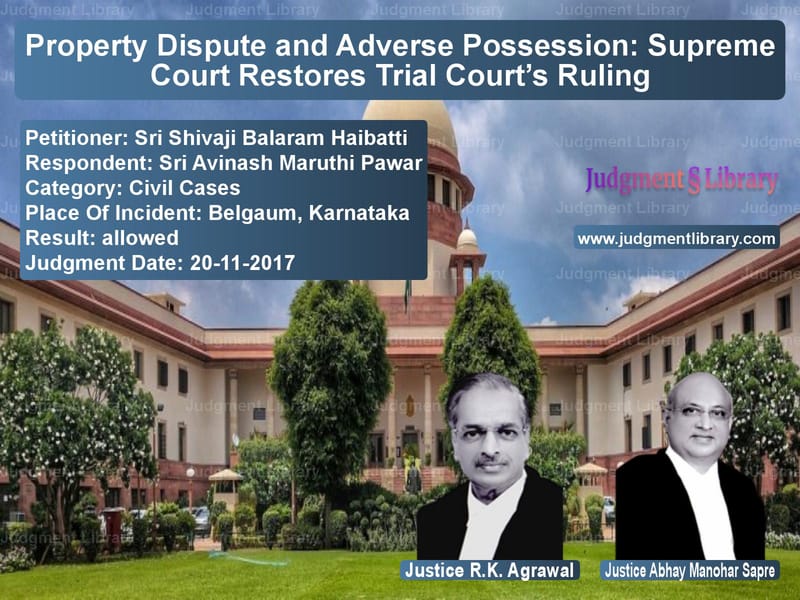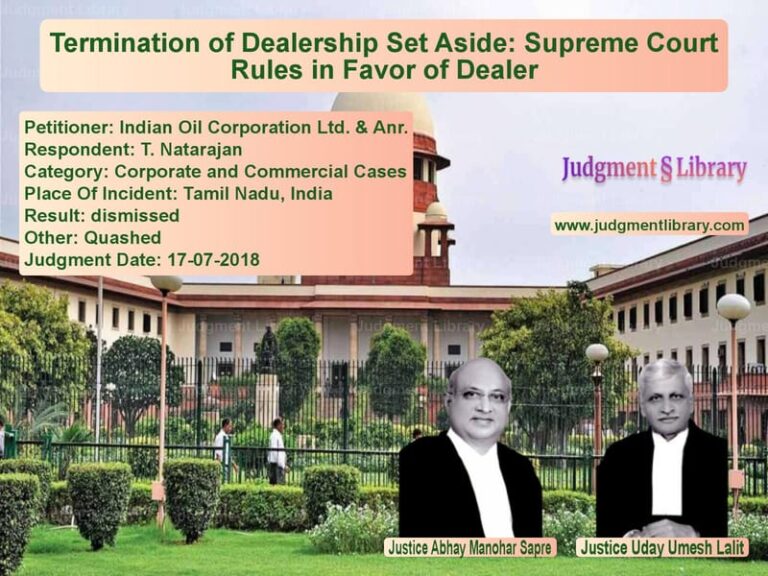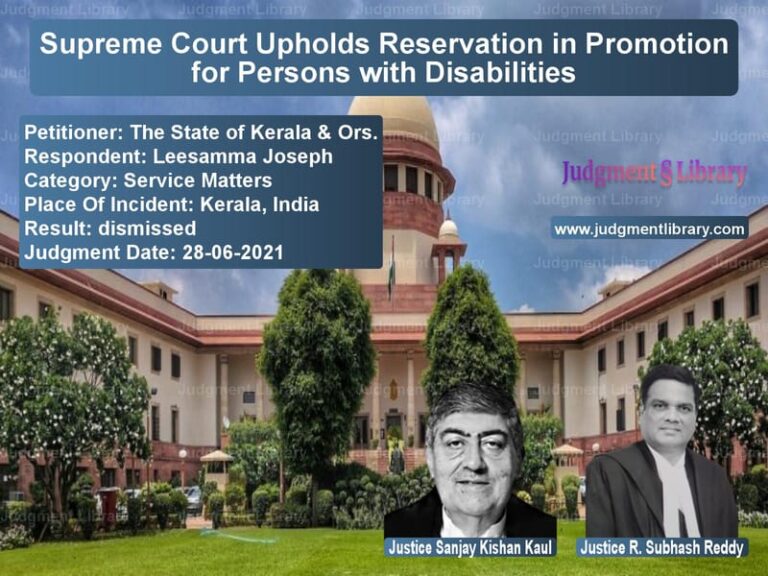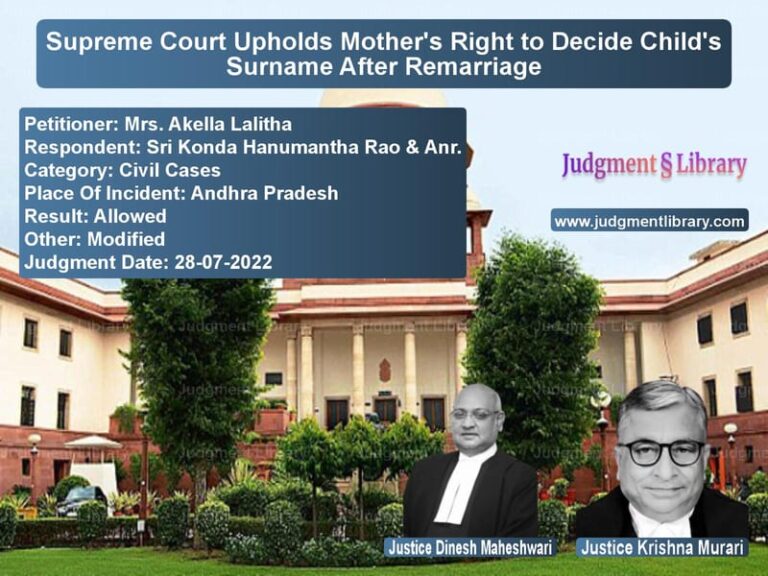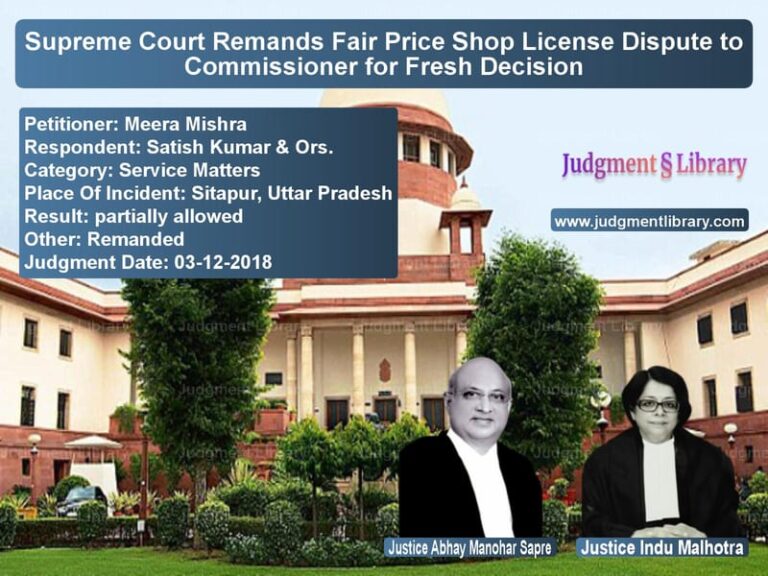Property Dispute and Adverse Possession: Supreme Court Restores Trial Court’s Ruling
The Supreme Court of India recently ruled on the case of Sri Shivaji Balaram Haibatti vs. Sri Avinash Maruthi Pawar, addressing a significant property dispute involving claims of ownership and adverse possession. The case revolved around a shop property in Belgaum, Karnataka, and brought up critical legal issues regarding rightful ownership and the doctrine of adverse possession.
The dispute arose when the appellant, Sri Shivaji Balaram Haibatti, purchased the suit shop via a registered sale deed and sought possession from the respondent, Sri Avinash Maruthi Pawar, who was in occupation of the property. The appellant argued that the respondent was in illegal possession of the shop, whereas the respondent contended that he had been occupying the property since time immemorial and had acquired ownership through adverse possession. The case progressed through multiple levels of the judiciary, with the Supreme Court ultimately restoring the trial court’s decision in favor of the appellant.
Background of the Case
The case involved a property dispute over a small shop measuring 9 ft. 9 inches North and 5 ft. East-West, part of a larger land parcel in the City of Belgaum. Originally owned by Vithal Dhopeshwarkar, the shop was sold to the appellant on 20.09.1997 through a registered sale deed.
At the time of purchase, the shop was occupied by the respondent. The appellant claimed that the respondent had no legal right to be in possession of the shop and demanded that he vacate it. However, the respondent refused, leading the appellant to file a suit for possession and mesne profits (compensation for illegal occupation) in the Civil Judge, Sr. Division, Belgaum in 1999.
Arguments of the Petitioner (Appellant)
- The appellant argued that he was the rightful owner of the shop, having purchased it through a valid registered sale deed.
- He claimed that the respondent was an unauthorized occupant and had no legal rights over the shop.
- The appellant stated that he had requested the respondent to vacate the shop, but the latter refused.
- He sought possession of the shop along with mesne profits at the rate of Rs. 2500 per month.
Arguments of the Respondent
- The respondent denied the appellant’s ownership and claimed that he had been in possession of the shop since time immemorial.
- He asserted that he had acquired ownership through adverse possession against the previous owner as well as the appellant.
- The respondent contended that since he had occupied the property for a long time, he should be considered the legal owner.
Trial Court and First Appellate Court Rulings
The trial court, after considering the evidence, ruled in favor of the appellant. Key findings included:
- The appellant was the lawful owner of the suit shop.
- The respondent failed to prove adverse possession as there was no evidence of continuous, hostile, and uninterrupted possession.
- The respondent was in illegal occupation of the shop.
- The appellant was entitled to possession and mesne profits at Rs. 2000 per month for a period of three years.
The respondent appealed to the First Appellate Court, which upheld the trial court’s decision, affirming that the appellant had established ownership and that the respondent had no legitimate claim over the property.
High Court’s Reversal
The respondent then filed a Regular Second Appeal before the Karnataka High Court (Dharwad Bench), which ruled in his favor. The High Court made the following observations:
- The respondent was in possession of the shop as a tenant and could not be evicted through the present suit.
- The appellant should have initiated proceedings under the Rent Control Act instead of filing a suit based on ownership.
- Accordingly, the High Court set aside the judgments of the trial and first appellate courts.
Supreme Court’s Analysis and Judgment
The Supreme Court found the High Court’s decision to be erroneous and restored the trial court’s ruling. The key points of the Supreme Court’s judgment were:
1. Misapplication of Second Appeal Law
The Supreme Court observed that under Section 100 of the Code of Civil Procedure, a second appeal could only be entertained on a substantial question of law. The High Court had failed to identify any such question.
2. No Evidence of Tenancy
The Supreme Court ruled that there was no evidence to establish that the respondent was a tenant:
- No rent receipts or lease agreements were produced.
- The respondent did not call upon the alleged landlord to testify.
3. Adverse Possession Not Established
The Supreme Court reaffirmed that the respondent had not satisfied the legal requirements to claim adverse possession:
- There was no proof of continuous, hostile, and uninterrupted possession for the prescribed period.
- Merely occupying the property without the owner’s objection was insufficient to claim ownership.
4. Misinterpretation of Ex-P.15
The High Court had relied on Ex-P.15 (sale deed) to infer tenancy. However, the Supreme Court clarified:
- The document only indicated that the respondent was in possession, but it did not establish tenancy.
- Without supporting evidence, no conclusion of tenancy could be drawn.
Final Judgment
The Supreme Court allowed the appeal, set aside the High Court’s judgment, and restored the trial court’s decree. The Court held:
- The appellant was the lawful owner of the shop.
- The respondent was in illegal occupation and had failed to prove tenancy or adverse possession.
- The appellant was entitled to possession and mesne profits as awarded by the trial court.
Conclusion
This ruling reinforces key legal principles:
- Ownership claims must be backed by proper title documents.
- Adverse possession requires clear and uninterrupted possession for the statutory period.
- A second appeal should be entertained only on a substantial question of law, not on mere re-evaluation of facts.
The Supreme Court’s decision ensures that property rights are protected from baseless claims and emphasizes the need for factual and legal rigor in disputes involving ownership and possession.
Don’t miss out on the full details! Download the complete judgment in PDF format below and gain valuable insights instantly!
Download Judgment: Sri Shivaji Balaram vs Sri Avinash Maruthi Supreme Court of India Judgment Dated 20-11-2017.pdf
Direct Downlaod Judgment: Direct downlaod this Judgment
See all petitions in Property Disputes
See all petitions in Landlord-Tenant Disputes
See all petitions in Specific Performance
See all petitions in Judgment by R K Agrawal
See all petitions in Judgment by Abhay Manohar Sapre
See all petitions in allowed
See all petitions in supreme court of India judgments November 2017
See all petitions in 2017 judgments
See all posts in Civil Cases Category
See all allowed petitions in Civil Cases Category
See all Dismissed petitions in Civil Cases Category
See all partially allowed petitions in Civil Cases Category

